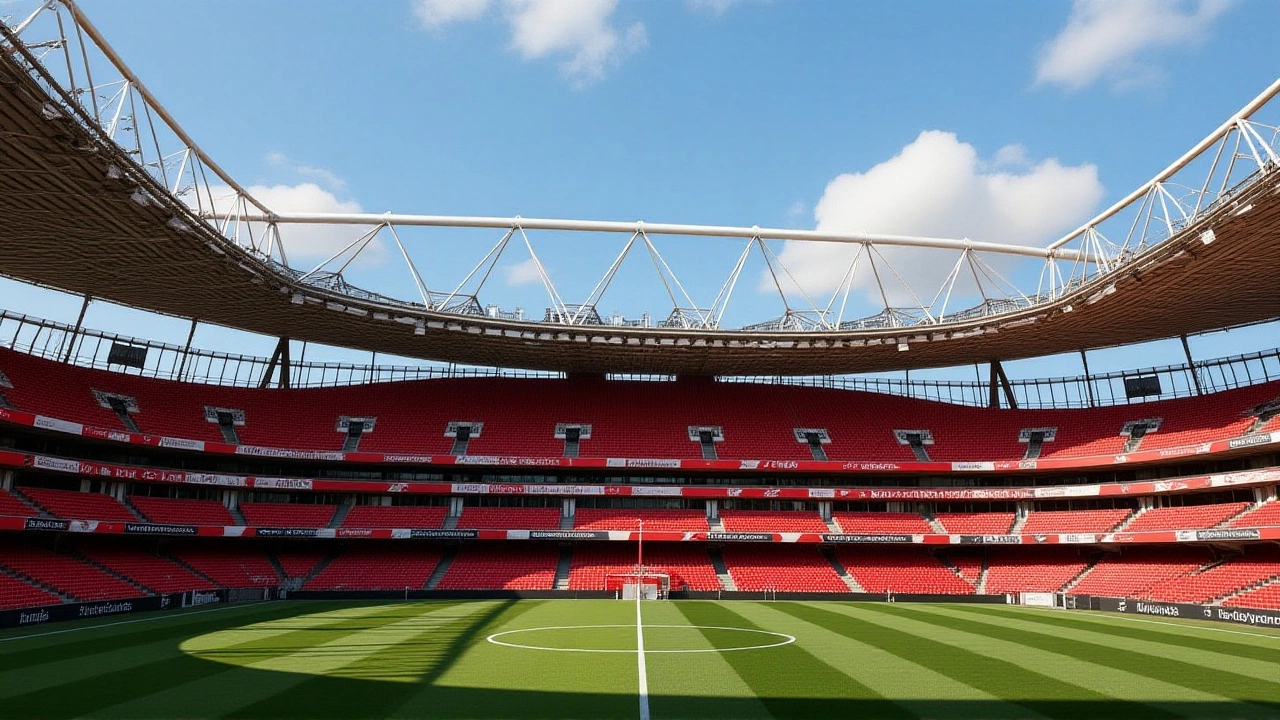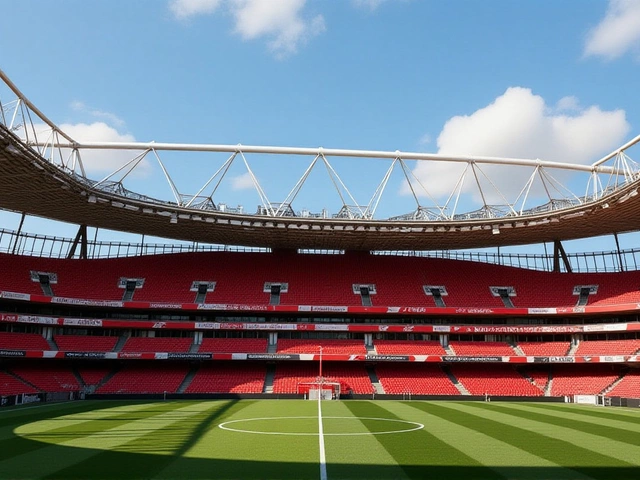Arsenal Rout Brighton 2-0 to Extend Winning Streak to Eight, 15-Year-Old Dowman Makes History

When Arsenal beat Brighton & Hove Albion 2-0 at Emirates Stadium on Wednesday, October 29, 2025, it wasn’t just another cup win — it was a statement. An 18-year-old academy graduate broke the deadlock. A 15-year-old became the club’s youngest ever starter. And a defense that’s looked impregnable all season kept its sixth clean sheet in a row. The final scoreline was 2-0, but the story? It was written in youth, grit, and quiet genius.
History Made Before the First Goal
Long before Ethan Nwaneri tucked home Myles Lewis-Skelly’s cross in the 57th minute, the night belonged to Maxwell Dowman. At 15 years, 9 months, and 28 days old — two days shy of his 16th birthday — the boy from Enfield became Arsenal’s youngest-ever starter in competitive football. He didn’t just sit on the bench. He started. At left wing-back. Against a Premier League side with a top-10 attack. And he didn’t look out of place. Not even close. His positioning, his composure under pressure, his willingness to track back — it all screamed veteran. The crowd roared when his name was read. Not out of pity. Out of awe.Manager Mikel Arteta had made 10 changes from Sunday’s 4-1 win at Crystal Palace. Only Eberechi Eze retained his spot. The rest? Academy kids, fringe players, and those who’d been nursing knocks. Declan Rice, William Saliba, Gabriel Martinelli — all rested. Even Bukayo Saka, who’d been ill, was held back. Arteta wasn’t playing for the result. He was playing for the future.
The Defense That Won’t Break
Brighton came out swinging. In the first 90 seconds, Kepa Arrizabalaga — the 33-year-old Spaniard playing in place of the injured David Raya — had to deny Carlos Baleba from 25 yards. Then, eight minutes in, he scrambled to block Giorginio Rutter’s one-on-one break. That was the pattern: Brighton pressed. Arsenal held. And held. And held.This is now six straight clean sheets. In 14 matches across all competitions this season, Arsenal have conceded just three goals. That’s not luck. That’s structure. That’s discipline. That’s a team that’s learned how to win without dominating. Their backline — White, Mosquera, Hincapié, Lewis-Skelly — barely broke a sweat. Even when Brighton & Hove Albion had 58% possession in the first half, they never truly threatened. The midfield trio of Nwaneri, Nørgaard, and Merino didn’t just shield the defense — they suffocated space. No room to turn. No time to pass. No rhythm to build.
The Goals That Changed the Game
Then came the 57th minute. A corner. A flick-on. Myles Lewis-Skelly, the 21-year-old academy left-back, floated a perfect ball into the six-yard box. Ethan Nwaneri, who’d spent the last two years playing U18s and U21s, timed his run like a veteran. He didn’t jump. He didn’t dive. He just steered it in — low, hard, right-footed. The Emirates erupted. His parents, in the stands, were already crying.It wasn’t pretty. But it was perfect.
Then, in the 86th minute, Bukayo Saka — who’d come on at 71’ after battling a fever — cut inside from the right. One touch. Two defenders. A flick. And a curler into the far corner. No celebration. Just a nod to the bench. He’d been off his game all week. But when it mattered? He delivered.
Arteta’s substitutions told the story. He didn’t just rotate — he tested. Gabriel came on for Hincapié. Timber for White. Zubimendi for Nørgaard. Rice, who’d been sidelined with a knock, came on for Nwaneri — a symbolic passing of the torch. And then there was Saka, the veteran on the bench, waiting for his moment. He didn’t need 90 minutes. He needed 15.
Brighton’s Absences and the Quiet Struggle
Brighton & Hove Albion were missing their heartbeat: Kaoru Mitoma, Joel Veltman, James Milner, and Solly March. All injured. All crucial. Their last Carabao Cup win? A 6-0 rout of Barnsley in September. But this wasn’t Barnsley. This was Arsenal — even with 10 changes. And they looked lost. No creativity. No urgency. Just frustration.Diego Gómez, who’d scored four against Barnsley, was barely a presence. Antonis Kostoulas and Christos Tzimas, their center-back pairing, were overwhelmed by the pace and intelligence of Arsenal’s transitions. Even when they did get forward, they were shut down before they could breathe.
What This Means for Arsenal’s Season
This win takes Arsenal into the Carabao Cup quarter-finals — their fourth straight season reaching that stage under Arteta. But more than that, it confirms a dangerous truth: this team doesn’t need their stars to win. They have depth. They have culture. They have a system that thrives even when the first XI is on vacation.They’re now four points clear at the top of the Premier League. Their defense is the best in Europe. And their academy? It’s not just producing players. It’s producing match-winners. Nwaneri, Dowman, Lewis-Skelly — they’re not future prospects. They’re here. Now.
Arteta didn’t just win a cup game. He proved his squad is built to last.
What’s Next?
Arsenal face a tough Premier League clash at Anfield next Wednesday against Liverpool. Saka, Rice, and Saliba are expected back. But the real question? Will Arteta start Dowman again? And if he does — will he be the next young star to carry this team into the future?For now, the answer is simple: watch them. Because this isn’t just a winning streak. It’s a revolution — quietly, beautifully, happening right under our noses.
Frequently Asked Questions
How did Arsenal manage to win with so many young players?
Arsenal’s system under Mikel Arteta emphasizes positional discipline and compact defending, allowing younger players to thrive without needing elite experience. The midfield trio of Nwaneri, Nørgaard, and Merino maintained shape, while the backline — filled with academy graduates — executed Arteta’s high-line, offside trap perfectly. The team’s 14-match defensive record (just three goals conceded) proves the system works regardless of personnel.
Why was Maxwell Dowman allowed to play at 15?
English football regulations permit players aged 15 and older to compete in senior cup competitions like the Carabao Cup. Dowman’s physical maturity, technical ability, and mental composure impressed the coaching staff during pre-season and youth fixtures. His debut breaks the previous record held by Cesc Fàbregas (16 years, 219 days) and signals Arsenal’s commitment to promoting talent based on readiness, not age.
What impact does this have on Arsenal’s transfer strategy?
With Nwaneri, Dowman, and Lewis-Skelly all delivering in high-stakes matches, Arsenal’s need for expensive signings in midfield and defense has diminished. The club may now prioritize long-term contracts for academy stars over short-term loans or big-money deals. This reduces wage bill pressure and increases squad cohesion — a key reason they’ve improved from 13th in 2022 to league leaders in 2025.
How does this compare to other youth-led victories in Premier League history?
While Manchester United’s 1999 treble featured youth products like Giggs and Scholes, no Premier League side has won eight straight games with 10+ academy starters in a single season since Arsenal’s 2003-04 Invincibles. This run is unique in its scale and timing — a blend of youth, tactical maturity, and defensive resilience that rivals the best eras in English football history.
What’s the significance of Bukayo Saka coming off the bench to score?
Saka’s goal — his 11th of the season — shows Arsenal’s depth. Even when his fitness is compromised, he remains a game-changer. His substitution in the 71st minute wasn’t a tactical tweak — it was a kill switch. That kind of impact from a substitute underscores why Arsenal are favorites to win multiple trophies this season, even with rotation.
Why didn’t Brighton play their best lineup?
Brighton were managing injuries — notably James Milner, Kaoru Mitoma, and Solly March — and prioritized Premier League survival. With only a 20% chance of winning the Carabao Cup, manager Fabian Hurzeler rotated heavily, fielding a squad with six players under 22. But without their key creators, they lacked the quality to break down Arsenal’s disciplined defense, even with early pressure.
